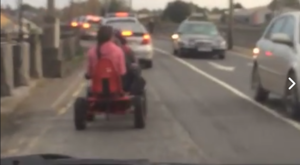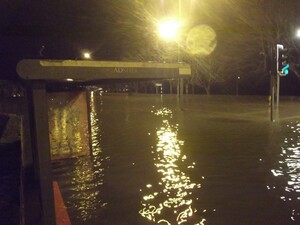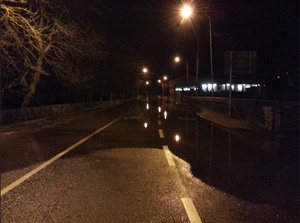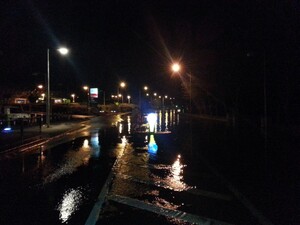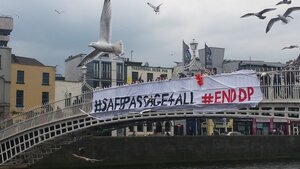
A banner placed on the Ha’penny Bridge in Dublin in February, calling for safe routes for people seeking refugee protection
Lecturer in Geography at University College Cork Piaras Mac Éinrí writes:
I don’t want to go into too much detail so as not to identify any parties, but I heard some truly disturbing stories today about the Department of Justice and Law Reform’s handling of such issues as family reunification for Syrian refugees.
A case in point: the woman in Syria who wanted to join her family in Ireland and who was obliged to travel at extraordinary personal danger and expense in order to obtain an identity document for onward travel, only to be informed that it would not be acceptable.
Assurances were given by Frances Fitzgerald, inside and outside the Dáil, that Ireland would be generous about such matters.
The reality is that a paltry number of individuals and families (I think approximately 20 individuals) have been accepted from Lebanese refugee camps in the past several months, while the bigger relocation programme, announced with much fanfare and whereby 4,000 people were to be accepted from overcrowded ‘hot spots’ in Greece and Italy, appears to be completely blocked.
A particular feature of the Department’s current approach seems to be that, even when people are brought in through UNHCR-brokered programmes, it is all done in virtual secrecy.
I met one Syrian family in Mallow a few weeks ago, as I wrote on Facebook at the time, as they had accidentally met up with friends of mine here who had themselves lived in Aleppo.
There are eight Syrian families in Mallow now – there is no security issue, or need for confidentiality, or anything else. Yet it has taken weeks to put them in touch with people who can help them, speak their language, provide them with the most basic assistance.
What is this about, if it is not an obsessive concern with control and an excessive wish to block anyone from civil society from offering help and support?
I have no doubt where much of the fault lies.
In all the changes which have taken place in government (and governance) in this country in the past half-century, one department remains virtually untouched. The Department of Justice has ‘captured’ virtually every minister appointed to it over the decades (I was told today that, for all of his faults, the only exception was Alan Shatter – he initiated a one-off programme of his own for Syrians and the civil servants hated it).
Their securocratic obsessions and slavish subservience to British policy (in the name of protecting the Common Travel Area), as well as their stubborn refusal to engage with other stakeholders, shows that nothing has changed.
My own experience as a civil servant in the 1980s was of dealing with a close-minded, bigoted, sometimes racist and utterly intransigent mindset.
Contrast this with the change in other departments, who now engage actively with other stakeholders – Foreign Affairs and the development policy community are a case in point.
Remember the Hungarians who came in 1956.
They were treated so badly by official Ireland that the vast majority could not wait to move to Canada, a country which offered them a real welcome.
Ironically, the camp where they were (literally) detained, Knockalisheen in Co. Clare is, perhaps not surprisingly, now a Direct Provision Centre. A kind of ‘no-place’ for invisible people.
The Department hasn’t changed since then; as far as I am concerned they have blood on their hands.
But ordinary Ireland has and stands ready to accept refugees in some numbers and make them welcome.
The twin new dangers now are that an absence of government makes ongoing paralysis ever more likely and a possible Brexit will lead to new talk of border controls and craven assurances from our securocrats that even greater care will be taken to prevent ‘undesirables’ from entering this jurisdiction in case they might attempt to use it as a back door to the other place.
I know that the big picture must be addressed and the war must be stopped. This will require greater efforts from the international community than have been evident to date.
In the short term, with Russia pursuing its own agenda, the USA convulsed by the run-up to the presidential elections and an incumbent lame duck and the EU fragmented and divided in several ways, there is little to hope for.
Already there are signs of multiple breaches of the ceasefire supposedly in place.
But, in the meantime, we have a role to play in our own small way and Ireland is in flagrant dereliction of its duty.
Please write to your TDs, if nothing else.
If you have the time and the energy, join an NGO/activist group, tell your students or school pupils about the situation, contribute funds to people providing support.
Syrian refugees in Ireland now (Piaras Mac Éinrí, Facebook)
Thanks Mark Malone




